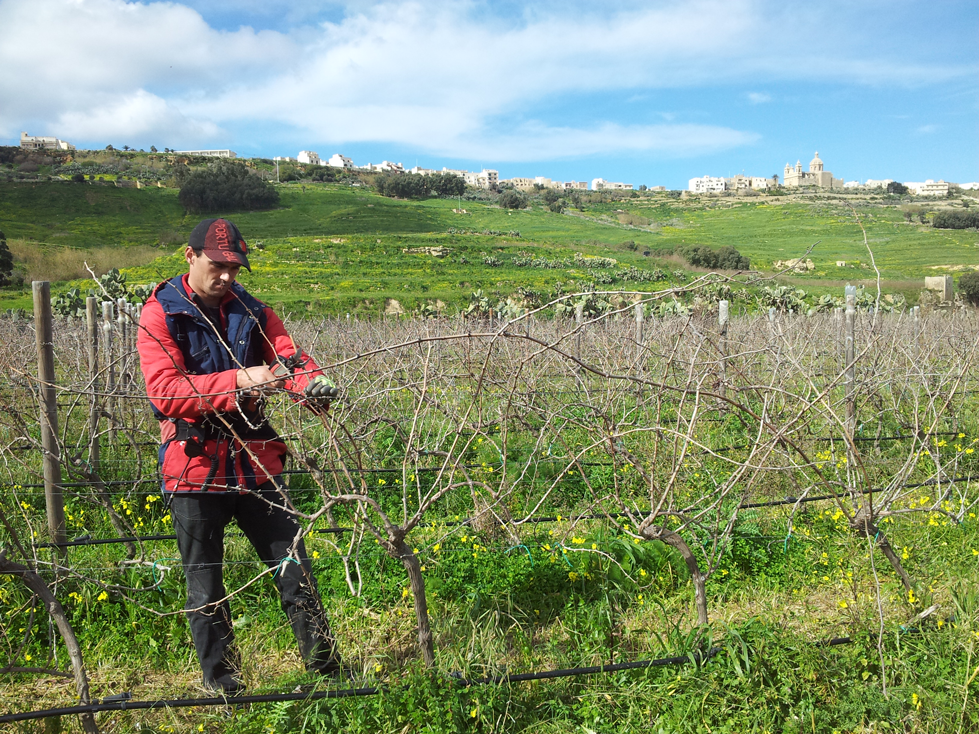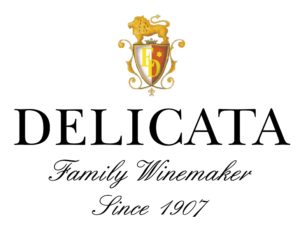Gozo Pruning

In a continued effort to raise the quality of its wines, Emmanuel Delicata Winemaker has just completed a repeat performance of the pioneering exercise in ‘customised pruning’ that it carried out last year. The pruning was carried out by a professional team of four French pruning experts, responsible for pruning some of the most prestigious appellations and chateaux in France.
This pruning team, specialise in pruning vines for quality focused vineyards, and specifically those growing under a Mediterranean climate. It is made up of pruners with a minimum of 15 years pruning experience. Each pruner averaged well over 1200 vines per day during their 6 day visit.
The very latest in pruning techniques was applied taking into consideration each and every vines particular grape variety and age, plus that vineyards soil composition, its micro climate and its I.G.T. or D.O.K classification. The introduction of these customised pruning techniques is another step taken by Delicata to help its growers achieve vineyard sustainability.
Sustainable viticulture, according to Jancis Robinson’s The Oxford Companion to Wine, is a form of viticultural practice which aims to avoid any form of environmental degradation while maintaining the economic viability of the vineyard. It is defined by the Sustainable Agriculture Research and Education Program (SAREP) at the University of California at Davis as “the principle that we must meet the needs of the present without compromising the ability of future generations to meet their own needs.”
This form of viticulture has the same goals as organic and biodynamic viticulture with one difference: It incorporates the “scientific method” into the formula. Basically it utilises the least amount of intervention possible while managing in a way that sustains the long-term health of the vineyards as well as the economic viability of the operation.
Sustainable viticulture views the vineyard as a whole system which creates a high level quality fruit production reducing reliance on synthetic chemicals and fertilizers to protect the growers, the consumers and the environment. Many conscientious vintners ascribe to this method and produce some very fine wines while pursing a responsible higher goal. Universities and private organizations responsibly teach and encourage these practices.
Sustainable winegrowing practices include achieving vineyard uniformity and vine balance as well as the management of soil, water, pests and human resources. In effect it means paying careful attention to the many details of farming on a daily basis, ensuring each practice optimizes vineyard inputs, such as water, energy, and nutrients, as well as vineyard output which is the yield of quality wine grapes. Being able to measure and quantify as many of these as possible is very important, too. The expression “If you can’t measure it, you can’t manage it” is very true for sustainable winegrowing.
The customised pruning methods used on the vines grown to produce grapes that will go into Delicata’s Q.W.P.S.R. wines, will also benefit from the reduced requirement for sprays and fertigation as a direct result of improved directional canopy growth. Even the varietal characteristics and the grapes flavour compounds will improve, as well as maximising the amount of fruit produced so that growers reach their full D.O.K. and I.G.T permitted yields. The benefits of this latest customised pruning will be seen when the farmers involved harvest this years 2013 grapes in August and September.
A spokesperson at the Delicata winery said “In our highly competitive world of wine, and being on a small island like ours with all the disadvantages that brings, sustainable viticulture is crucial and anything we can do to help our growers achieve that, especially whilst improving quality, is in everyone’s interest”.


